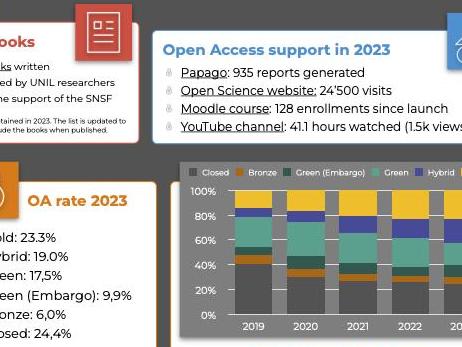
Research
Pushing back the frontiers of knowledge

At the cutting edge of academic research
The University of Lausanne (UNIL) has more than 190 research units in seven faculties. It relies on leading academics working in fields as diverse as genetics, the aesthetics of cinema, environmental law and forensic science.
Within the institutes, laboratories and libraries, about 3,000 researchers, including 580 professors, work every day on projects of national or international scope, thereby advancing the institution's academic capital. In order to promote the circulation of knowledge as effectively as possible, UNIL considers it vital to foster a strong culture of interdisciplinarity (one of the main thrusts of its strategic plan). To this end, it has a number of interdisciplinary centres, including the Interdisciplinary Centre for Mountain Research (CIRM), the Interdisciplinary Centre for Sports Research, the Interdisciplinary Centre for Ethics Research and the Interdisciplinary Centre for Life Course Research (LIVES-UNIL).
In addition to these centres, UNIL participates in several national research hubs (National Centres of Competence in Research – NCCRs), which are tools for encouraging cutting-edge research and supported by the Swiss Confederation. These include the Swiss Centre of Expertise in Life Course Research (LIVES) and the NCCR Microbiomes, in the field of medicine and life sciences. There are also numerous research projects that cross Swiss borders, resulting in fruitful collaborations with internationally renowned institutions.
UNIL promotes interdisciplinary research that is rooted in its local area and open to the world.
Latest research news
Themes
Read moreResearchers in UNIL's Faculties and Interdisciplinary Centres approach their research from different angles.
Research in all its forms
The Research Department coordinates the research support network, whose mission is to help create the best possible framework conditions for research, from the initial idea to its application in the market.
-
Research funding
Tangible funding sources to support your project.
-
Open Science
Open Science promotes open, responsible and participatory science and has been part of UNIL's strategic plans since 2017.
-
Ethics and professional conduct
Rules and good practices to ensure the ethical and responsible academic conduct of all research projects.
Reference publications and research topics
-
Unisciences
Database of UNIL researchers.
-
SERVAL
Institutional repository for publications by UNIL and CHUV researchers.
-
Theses
Catalogue of UNIL theses, which can be selected by author, title, Faculty or year of submission.
-
Open Access
Native publications on journals and books under free use or Creative Commons licences.
Research policy
A three-pronged policy aimed at enhancing the value of research and increasing its influence.
Adding value to research
This essential approach guarantees the transparency, integrity and reliability of research results; it is measured primarily in the light of its various impacts, whether societal (legislative, societal, etc.), scientific (sharing of data, publications and other products) or economic (patents, spin-offs, etc.) and is dependent on developments in the context of the reform of research assessment, which aims to make research more diverse, inclusive and open.
Transparency, through the management and sharing of data and publications (Open Science), helps to increase the visibility and impact of research, thereby enhancing the status of researchers and their institutions.
This policy also involves innovation (PACTT: Powering Academia-industry Collaborations and Technology Transfer), links with society via the Culture and Scientific Mediation Unit (SCMS), research partnerships (such as the ColLaboratory) and openness to Europe with the CIVIS Open Labs.
Supporting development in all fields and from an international perspective
UNIL is constantly investing in infrastructure and tools to keep its research at the highest level. It aims to further improve its internal research support network, in order to support the submission of funding applications, assist in the management of these projects and promote their results.
By collaborating with the best groups in the world and with the most demanding expert committees, UNIL researchers have constant opportunities for continuous improvement.
International collaboration and identifying external funding sources are also an integral part of this approach.
Developing interdisciplinarity
Cutting-edge research requires specialists, but it also needs to decompartmentalise knowledge (particularly between the humanities and social sciences, life sciences and environmental sciences). UNIL aims to promote interdisciplinary synergies in research and teaching. It also aims to distil this culture of interdisciplinarity at all levels within its student body to enable its young graduates to adopt an integrated vision of the many technical and societal challenges facing us today.







